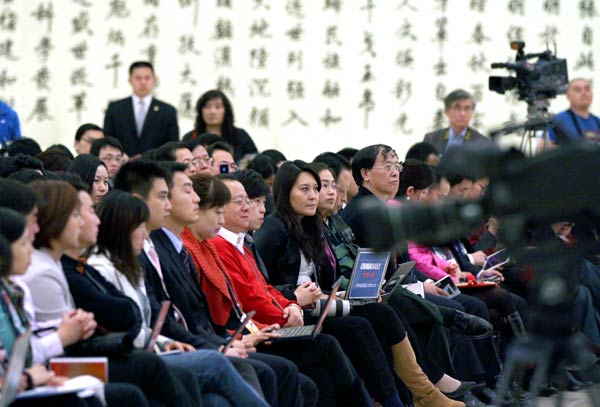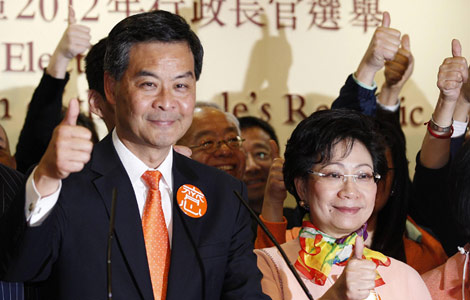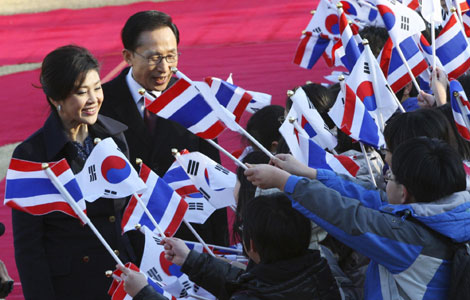 |
|
|
|
|||||||||
 |
|
Reporters attend the news conference of Foreign Minister Yang Jiechi at the Great Hall of the People in Beijing on Tuesday. JIANG DONG / CHINA DAILY |
Relations with Tokyo have come a long way, says foreign minister
Foreign Minister Yang Jiechi on Tuesday urged Japan to "fully recognize" the complexity and sensitivity of issues concerning the understanding of history and China's Diaoyu Islands, as the two countries prepare for the 40th anniversary of the normalization of diplomatic ties this year.
"They concern the political foundation and overall interests of China-Japan relations," Yang said at a news conference on the sidelines of the annual session of the National People's Congress, China's top legislature.
He called on the Japanese side to "truly take history as mirror and look forward to the future", and "properly handle these sensitive issues" based on the overall interests of China-Japan relations.
To enhance strategic trust between China and Japan, it is crucial that both sides view each other's development objectively and strategically, and truly see each other as an opportunity and partner for development, said Yang.
"The China-Japan relationship has come a long way in a wide range of fields, and the Chinese government attaches great importance to its relationship with Japan," said Yang.
China and Japan normalized diplomatic relations in September 1972.
Both sides should intensify exchanges at various levels, particularly between young people, and improve national sentiments toward the other side, the foreign minister said.
Yang also called for more efforts from China, Japan and the Republic of Korea to promote the building of the China-Japan-ROK free trade area and push forward a cooperative partnership among the three countries.
China this year is the coordinator of the China, Japan and ROK trilateral cooperation mechanism, and Beijing will host the fifth China-Japan-ROK leaders' meeting later this year.
Hailing increased cooperation with its neighbors, Yang said China expects that the upcoming BRICS Summit, to be held in New Delhi late this month, will add new impetus to the global economic recovery.
BRICS brings together the five major emerging economies of China, Brazil, Russia, India and South Africa.
China hopes to enhance cooperation among BRICS members, especially in the economic and financial fields, in order to benefit the people of these countries and the rest of the world, Yang added.
The rapid growth of emerging economies, including BRICS members, will be conducive to making the international order more just and equitable, Yang said.
Yang said that China expects disagreements with its Asian neighbors to be resolved through dialogue and consultation.
On the South China Sea issue, Yang said China always believes the disputes should be properly resolved through direct negotiations between the relevant parties on the basis of facts and in accordance with the basic norms governing international relations.
The Philippines, Vietnam, Malaysia and Brunei dispute China's sovereignty over some islands and waters in the South China Sea.
Pending final settlement of disputes, the parties concerned may put aside their disputes and engage in joint development, Yang said.
Liu Jiangyong, vice-dean of the Institute of Modern International Relations at Tsinghua University, said although some neighboring countries have close economic and trade cooperation with China, lack of trust on security issues is the reason why they also have territorial disputes.
"Concerns over whether China will use military means to solve disputes as it becomes stronger are not at all necessary. Worse still, these concerns are easily taken advantage of by countries outside the region to sell arms and contain China's development," Liu told China Daily.
Yang stressed that China's relationship with its neighboring countries should be viewed in "a broader context" of the general trend of development and said the general trend is "positive".
Yang said that during his recent visits to some Asian countries, he felt that they wanted to see the sustained positive momentum of the Chinese economy and hoped that China would continue its development.
China has become the largest trading partner for the majority of its neighbors. China's investment in Asia approached $20 billion in 2011, with unprecedented cooperation in science and technology, finance, energy, and infrastructure.
China also works closely with other Asian countries in handling major regional and international issues, pushing forward regional cooperation and tackling the international financial crisis and major natural disasters.
chengguangjin@chinadaily.com.cn
(China Daily 03/07/2012 page5)
Wu Ying, iPad, Jeremy Lin, Valentine's Day, Real Name, Whitney Houston, Syria,Iranian issue, Sanyan tourism, Giving birth in Hong Kong, Cadmium spill, housing policy

|

|

|

|

|

|